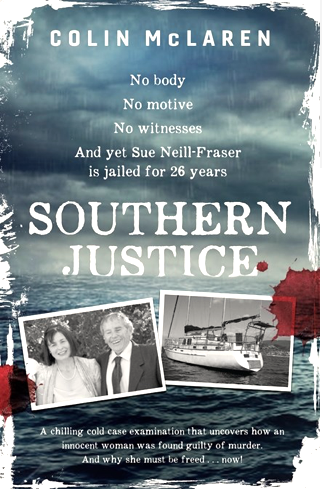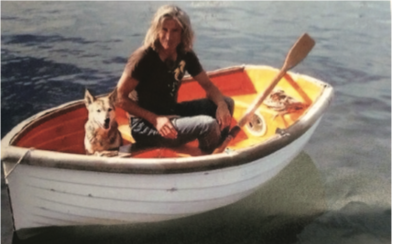In our February 12, 2019 report (Abuse of Power – Tasmania style), we exposed a tendency by Tasmania’s legal system to frustrate the process in which Sue Neill-Fraser is seeking leave to appeal her murder conviction. And how frustrating were the delays that have stretched the process over three years.
The author of the probing book on the Sue Neill-Fraser case, Southern Justice (Hachette),  Colin McLaren, was cross examined in the Supreme Court in Hobart on February 5 & 6, 2019 – the last witness in the process of seeking leave to appeal. (See McLaren interviewed on Today, Channel 9, Feb 15, 2019)
Colin McLaren, was cross examined in the Supreme Court in Hobart on February 5 & 6, 2019 – the last witness in the process of seeking leave to appeal. (See McLaren interviewed on Today, Channel 9, Feb 15, 2019)
Justice Brett has reserved his decision, expected to be delivered at the end of February 2019, over three years after this process started, more than 10 years after Chappell went missing and nine and half years since Neill-Fraser was arrested for his murder. Delays have pockmarked the process:
EXAMPLE: The December 11, 2018 directions hearing followed the DPP having failed to respond within the 28 day court deadline to McLaren’s affidavit – nor after an extension of a further 28 days, and then still had to be chased up. McLaren had outlined his extensive policing background (a former Detective Sergeant and Task Force Team leader in Victoria), and evidence about Meaghan Vass, the homeless girl whose DNA was found on the Four Winds yacht from which Bob Chappell had disappeared.
EXAMPLE: the time wasting introduction of a new witness at the hearing in March 2018, Sandra Miedecke, who was also present on board at the time of the encounter between  Grant Maddock (at left in 2009 – originally mistaken in the dark of night for a ‘female figure’, supposedly Neill-Fraser) and John Brettingham-Moore’s boat on the night of January 26, 2009. Her inability to remember exact dates didn’t help,
Grant Maddock (at left in 2009 – originally mistaken in the dark of night for a ‘female figure’, supposedly Neill-Fraser) and John Brettingham-Moore’s boat on the night of January 26, 2009. Her inability to remember exact dates didn’t help,
but in trying to discredit the date of January 26, given by the two men, the DPP was hoping to suggest that in fact that encounter took place on January 24. He could not have forgotten (?) that Brettingham-Moore had given evidence that he found out about Bob Chappell’s disappearance in the morning after that encounter with Maddock. Not two days before it happened. (And the DPP would have also been aware that there was no evidence to show Neill-Fraser had returned to the yacht on January 26, other than the mis-identification of Maddock that night for Neill-Fraser.)
EXAMPLE: The history of the process of seeking leave to appeal began with incessant objections from the DPP about almost everything presented on Neill-Fraser’s behalf
during the preliminary stages in 2016 and 2017. Months separated each hearing. The public is entitled to ask the DPP: “If you are truly concerned with finding the truth, Mr Coates, as is your duty, you would welcome a full, independent review of this troubling case, which a new appeal would provide.”
EXAMPLE: During the hearing at the end of August 2018, the DPP was unable to complete his lengthy oral submission on the last scheduled day and the court had to be adjourned for a further week – to sit in Launceston. (At yet more stress & cost to Neill-Fraser’s family…) Defence barrister Tom Percy QC completed his in a couple of hours.
Amidst all the word-fumbling, there was one brief moment of wry courtroom humour (hearing on August 23, 2018):
MR COATES SC: If – if the witness could – sorry – sorry, your Honour. If the – if the – I was almost then going to say the accused … if his Honour could be shown P02.
HIS HONOUR: You’ve worked out I’m not a witness or an accused; I’m actually the Judge. Yes.
MR COATES SC: Yes.
But it’s no laughing matter: the stakes are high for all concerned. Liberty and exoneration for Sue Neill-Fraser, extensive – and official – reputational damage to the legal profession and the State itself.
It says something about the efficiency legal system that a potential miscarriage of justice in a matter as serious as murder – with its ramifications on the person convicted – takes so long to be addressed. In this case, if an appeal is to be mounted, it will be several months (at least) before the case is finalised.

The actions of the Premier,Daryl Coates SC and the Police in Tasmania should hang their heads in shame .Yes the Justice system is on their side and they have the laws to back them up,but we as citizens look at the facts that have been exposed that have created more than a reasonable doubt in this case .It is clear that mistakes have been made in this case .The Police certainly believed they had the right person to charge ,mainly because Sue Neill-Fraser was very unsure in answering questions and was emotionally under pressure and she made mistakes in where she was at certain times. Of course the Police are going to pounce on this evidence as proof of her guilt. Its at this stage Police can put on the blinkers as they did in the Andrew Mallard case in Western Australia. However in doing so they didn’t follow up on all the other possibilities of others involved in this inquiry. Looking at this case one can understand how people lose faith in those who have the power behind them and those same people don’t carry out their duties as honestly and as fairly and with the integrity that the citizens of this country expect .
This case exemplifies foremost a high regard for the maintenance of aspirational public office holders whose positions achieved, make for them a priority that their reputations are unblemished. If a witness at high risk of harm has the courage to present herself for the sake of justice, how can those unwilling to acknowledge her and the likely truth of her testimony, defend their diminished decency to respond without appropriate consideration? How can the fact that the conviction is potentially unsound be ignored? It appears that the legal system process in this matter itself is demonstrably beyond the notion of adversarial to a disturbing degree. Why is an appeal decision still not issued? Altogether confidence is past erosion in how this matter was initially investigated, and the reality is that the longer this situation languishes, and including of course the personal and actual entrapment of the convicted, corrosion of trust is inevitable, with a more far reaching impact on the community.
I honestly am totally gobsmacked by the incompetence of the Dpp not investigating this case properly I don’t know and I want to know WHY.
I believe what Colin McLaren explained about building in this case that the investigation was centered on a Brick.
They apparently concentrated on just one statement and built a Brick around it.
I keep asking myself…if Tas Police and the Office of the DPP in Tasmania are so certain there has been no miscarriage of justice, no errors made whatsoever and no chance AT ALL of Susan Neill – Fraser being found innocent, with perhaps some other person(s) involved instead, in the disappearance of Bob Chappell, why oh why is there such vitriol, such resistance, such desperation to hinder the leave to appeal process?
Methinks it is so obvious that we all know why….. every single Tasmanian and for that matter every Australian should step up and DEMAND an urgent case review in the light of the apparent plethora of UNADDRESSED evidence, leads, witnesses and lines of enquiry. Clearly it takes courage to admit and deal with omissions, errors and dare I say the alleged corruption and collusion. Again I repeat eminent Senior Counsel have expressed their views that this conviction is unsafe, not “maybe unsafe”, plain UNSAFE; they have even informed the Tasmanian Premier, so why I ask is nobody in the Tasmanian legal and political arenas listening? There are two many loose ends in my view. I believe what is desperately needed is an URGENT INDEPENDENT ENQUIRY NOW – to deliver transparency and a search for the truth as to what happened on the Four Winds on Australia Day in 2009 -in my view, way overdue.
Its typical bureaucracy! They never want to admit fault – look at how much the Fed government spent on the BER – and when it was publicly pointed out how they had been diddled for pricing, they did nothing! Too proud to admit error.
In spite of Coates’ long drawn-out style, he gains convictions by whatever-it-takes means. That’s all that matters especially for statistics for DoJ Annual Reports, justifying ODPP expenditure.
In my view, the ODPP ought be obliged to declare the total costs of opposing the current SN-F application before Supreme Court. I suspect any amount is justified when one considers the fear (within the DoJ) of what it may cost if the truth is exposed.